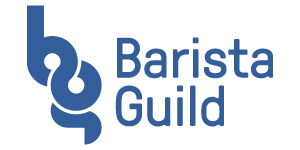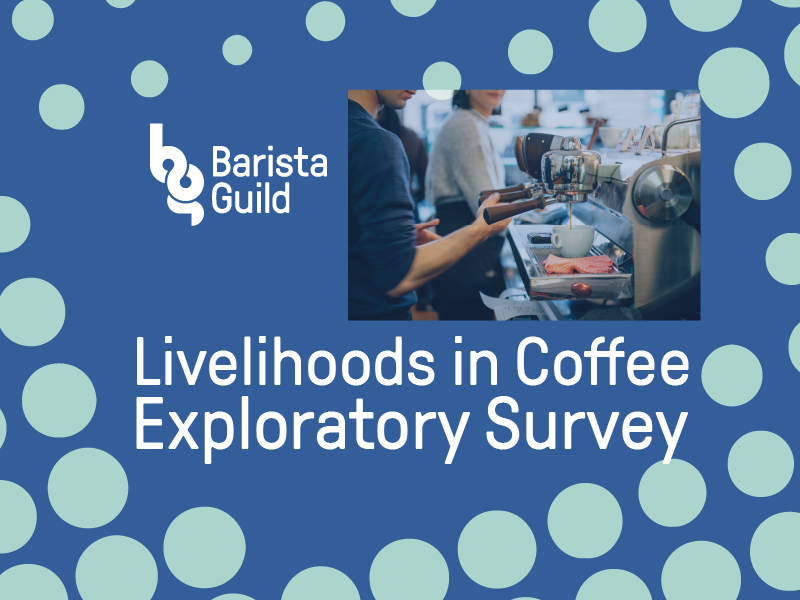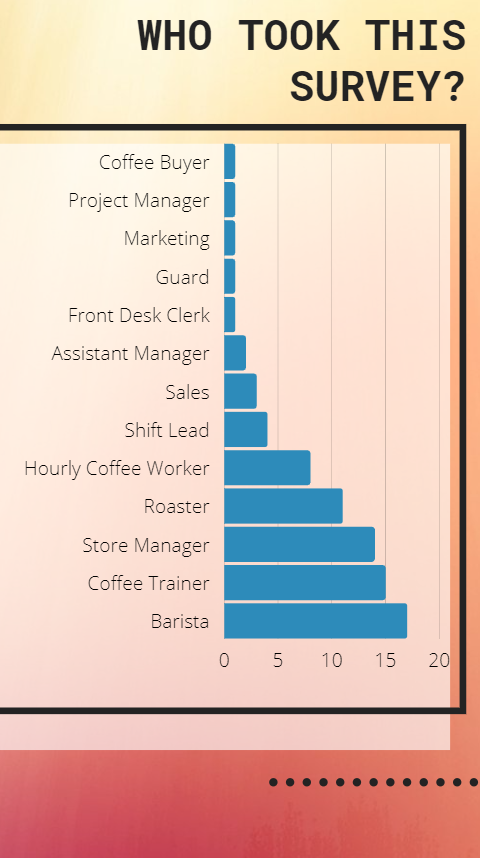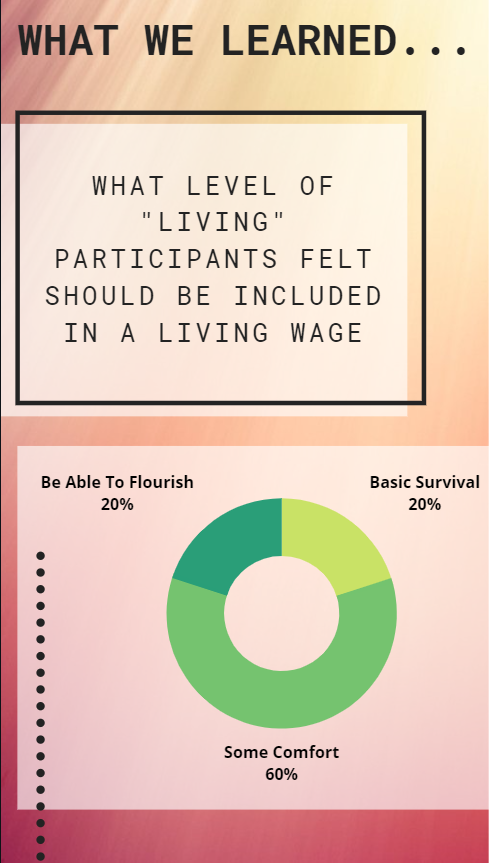Livelihoods in Coffee: Exploratory Survey Results
Introduction
Over the last few years there has been increasing interest in the concepts of a living wage and a living income in coffee. A living wage is an amount a worker is paid and must be sufficient for the worker and their family to afford a decent standard of living, elements of which include food, housing, education, transportation, with extra to cover unexpected events. A living income refers to the net annual household income required to afford that same decent standard of living. There are many perspectives when it comes to a living wage and income in coffee: the perspective of the hourly coffee worker, the coffee business owner, the farm laborers, etc. All perspectives at opposite ends of the value chain have similar livelihood needs, but also have important differences. As the Barista Guild, we wanted to further the conversation in our own community by exploring the perspective of the hourly coffee worker (workers who receive hourly compensation at their jobs).
The main goal of this project is to drive the conversation on “Livelihoods in Coffee” continuously on a global scale. With this initial exploratory survey, we looked to gather a broader overview and insight of where the hourly coffee worker stands on the topic and concept of a living wage, and to understand the diverse nature and community of hourly coffee workers.
Methodology & Limitations of this Survey
The total number of respondents was 103, across a fairly wide geographic scale. Coffee professionals from Hong Kong, the Netherlands, the United Kingdom, Bulgaria, Denmark, Canada, Germany, France, Belgium, Puerto Rico, Vietnam, Croatia, Czechia, Slovenia, and Italy offered their thoughts, though the survey-takers were predominantly located in the continental United States: 68 out of the 103, or 66%.
To get a clearer picture of who is in the community of hourly coffee workers, we gathered demographic information that showed that the largest percentage of hourly coffee workers polled were in the 26-35 age range at just over 56% with the next highest participation coming in at 25.3% in the 36-50 age range. The participants were 46% men, 43% women, 8% gender non-conforming, with the remainder preferring not to disclose. Just over half of these workers (51.8%) had more than 7 years experience in the coffee industry with the remaining half split nearly evenly in the 1-2 year, 3-4 year, and 5-6 year ranges. Participants showed to be working largely in retail customer facing positions with baristas, coffee trainers, and store managers in the majority, followed closely by roasters. Of those polled, 74% worked for small independent companies located primarily in the US and Europe.
One of the areas where we would like to add more dialled-in data capture is around specific geographic location. We recognize that the living wage will vary by country, and nowhere is that division of cost vs income as clear as in the United States. This survey did not require respondents to indicate which city or state they live in, which would have had a significant impact on the results and our interpretation of them. We also did not require respondents to indicate their racial identity, which is also a factor that impacts our interpretation. Again, taking the US as the primary example, some reports have found a Hispanic-White wage gap of just over 12%, and a Black-White wage gap of nearly 15%. (This does not take the intersection of race and gender into account.)
Another area of information that is absent from this survey and its responses are whether or not the individuals who replied are responsible for the care of others in their households; for example whether they have a partner who also works to earn shared income, or whether there are dependent children, other family members who require care, or recurring medical bills for a member or members of the household. These factors play a considerable role in determining whether or not a pay rate meets the requirements for living wage.
Finally we did not require respondents to include their hourly wage or their average hourly tips (if applicable), which again limits us to evaluating the responses based on the individual survey takers’ assessment of whether or not they were earning a living wage. Without hard figures, this is impossible to quantify.
While we at the Barista Guild are thrilled that 103 people chose to respond to this survey and help us gather data, we recognize that the number is hardly representative of any coffee-professional community in any country. It does, however, serve as a starting point for both the larger conversation around living wage, and helps us identify key gaps in our data collection as we consider next steps with regards to poll-taking and/or other forms or research. We hope that offering this breakdown will spark more open conversations and inspire business owners and coffee professionals to find solutions to the ongoing work of creating a more sustainable coffee industry in which all participating individuals can thrive.
Results
The participants were polled on:
- their understanding of the concept of a living wage
- what level of personal comfort they felt was expected
- whether they believed they were making, or had ever made, a living wage
- what elements were being overlooked in the living wage discussion
We were happy to discover that close to 40% of those polled consider themselves, by self-defined metrics, to be ‘making a living wage’. More worryingly however, almost 30% consider themselves as ‘not making a living wage’ and close to 25% consider themselves as ‘never having made a living wage’. We also found that there is a huge variety in definitions and terms used by people to describe their understanding of a living wage and what it means. So while some of our results are concerning, they are helpful part of a wider conversation and show us that we can help the community towards a common understanding. This way, we make sure we are talking about the same topics/themes.
According to 76.5% of the participants, a living wage encompasses more than just a fair salary. Healthcare was by far the most named benefit that a living wage should include. The second, third and fourth benefits are paid time off, a retirement option, and children/family leave, with education as a close fifth. This shows that there is one prime benefit employers should look into offering — while also including other things on the agenda to talk about. If 60% of participants are telling us that a level of comfort and minimal stress should be some of the few benefits available to baristas in Specialty Coffee, we all should be discussing talking on how to get there.
While analyzing the results some unexpected data points arose. One of these points was an implied desire, as well as value, associated with education in coffee. A question asked of participants was what they felt a living wage encompassed beyond wages earned. This led to some of the answers one would expect, such as paid time off and health care, but 5% of respondents also mentioned education as one of the items to be included, which was surprising as this was mentioned more than transportation. This desire, or established value for education, was brought up in other questions, most notably when asking respondents if they considered themselves to be making a living wage. More than 65% of respondents who had taken a formal certification course, such as CQI’s Arabica Q Grader Course or SCA Coffee Skills Program Courses, felt they were currently making a living wage. This survey was not geared towards investigating people’s education level, nor their interest in education. The first two questions mentioned didn’t have options for multiple choice, so the participants who mentioned education, actively came up with that thought.
Conclusion
After looking at the survey results we became more interested in finding out who we might have excluded from the equation of Sustainable Livelihoods in Coffee for Baristas. That is why we still think it is important to call to you, all baristas of the specialty world, to share your perspective.
If you are part of a coffee company, you work for an independent coffee brand or you own a specialty café, give us a shout! Are you currently making a living wage? Do you think you can make a career and have more opportunities through education or out of a competition experience?
Share your opinions and comment your thoughts on this post. We want to hear them all.
Written by Bailey, Kathie, Paco, Zoey and Meister, all members of the Barista Guild Leadership Council





